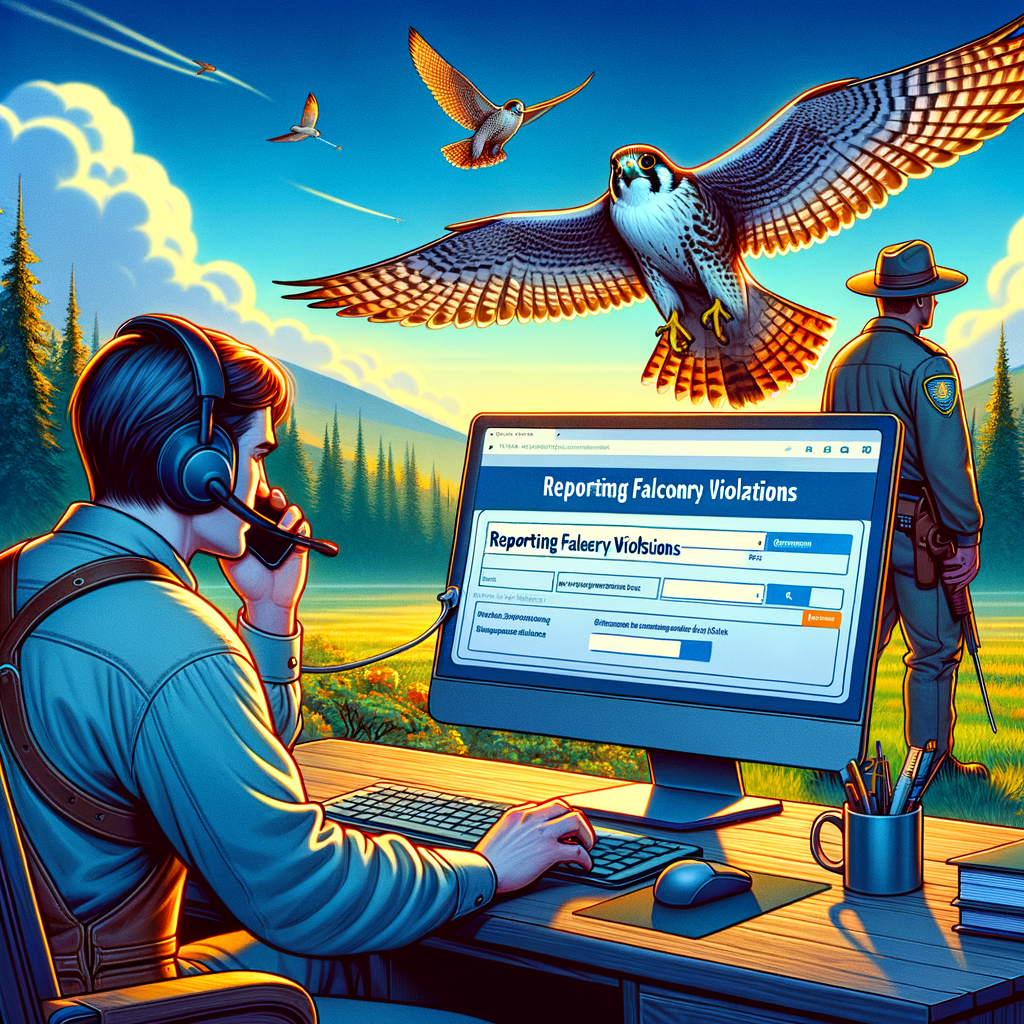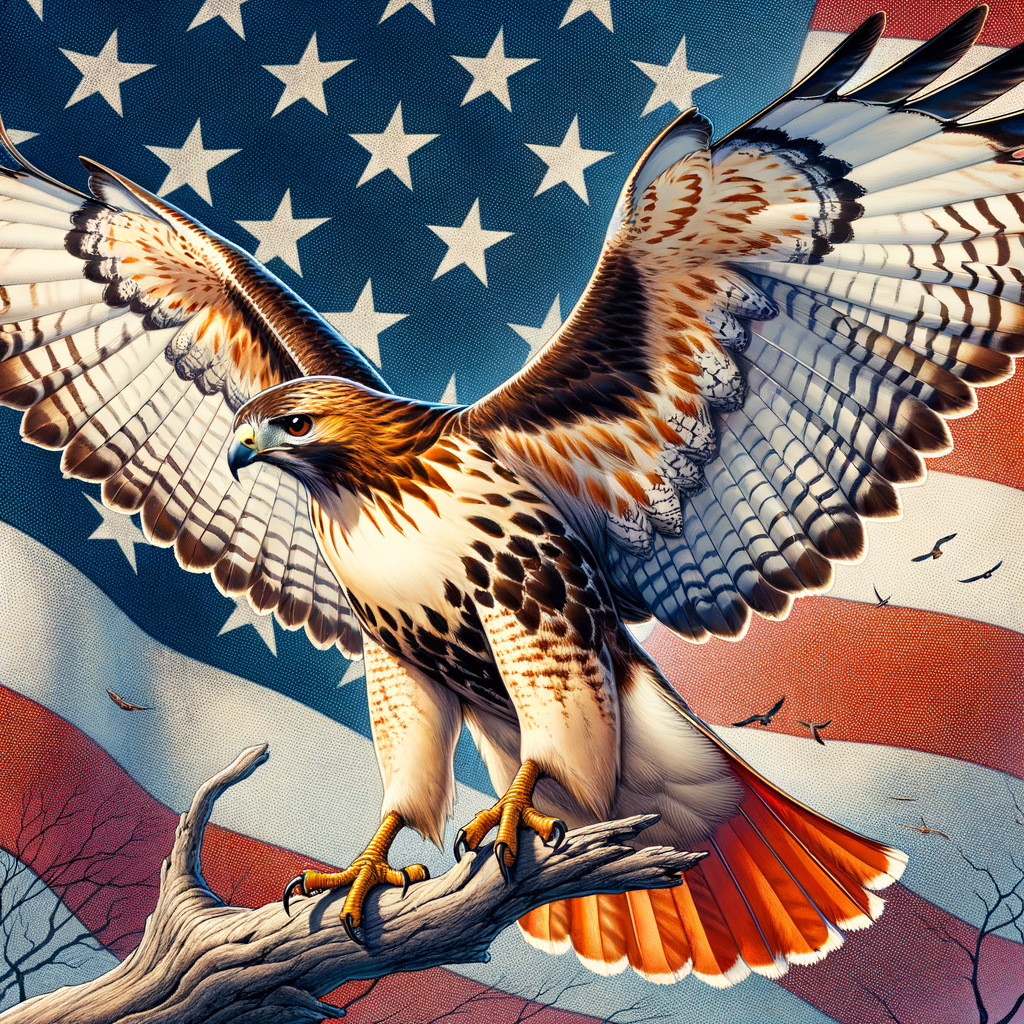Key Highlights on Falconry Regulations and Violations
- Importance of Falconry Regulations: Falconry rules help keep both the birds and people safe.
- Common Violations: Some frequent issues include unlicensed falconry practice, improper care, and failure to keep accurate records.
- Legal Consequences: Violating falconry laws can result in fines, license suspension, or even jail time.
- Ethical Considerations: Responsible falconers respect wildlife laws and treat their birds with care and respect.
- Reporting Mechanisms: There are systems in place for reporting falconry violations to ensure the sport remains safe and ethical.
- Continuous Education: Falconers should regularly update themselves on laws and best practices for the well-being of their birds.
- Community Role: The falconry community plays a crucial part in monitoring and maintaining high standards by reporting any witnessed violations.
Reporting Falconry Violations: Why It’s Crucial for Our Feathered Friends
Imagine you’re in the beautiful Irish countryside, rolling green hills all around you. You notice a farmer tending to his sheep, keeping a vigilant eye out for predators. He knows that every sheep counts, just as every bird counts in falconry. Reporting any issues or violations in falconry is much like this watchful farmer ‘ it’s crucial for maintaining a balanced, ethical, and safe environment for our feathered friends.
At Learn Falconry, we’re passionate about the ancient and honorable art of falconry, and we believe that protecting these magnificent birds isn’t just a duty; it’s a shared responsibility. In this article, we’ll dive into why reporting falconry violations is vital and how you can play a part in safeguarding these incredible creatures. So, stick around! We’ll explore the common types of violations, how to identify them, and most importantly, how your actions can positively impact the falconry community and ensure the welfare of these winged wonders.
Understanding and Reporting Falconry Violations
At Learn Falconry, we are passionate about promoting ethical and legal falconry practices worldwide. Part of ensuring the integrity and sustainability of this ancient art is understanding and reporting falconry violations. Falconry violations can include various illegal activities, some of which may not be immediately evident to the untrained eye. Here’s what you need to know about reporting illegal falconry and how legal falconry enforcement helps protect both birds of prey and the falconry community.
What Are Falconry Violations?
Falconry violations refer to breaches of laws and regulations governing the practice of falconry. These violations can range from using unpermitted birds, engaging in unlicensed falconry, mistreatment of birds, to illegal trade and transport of falcons. To dive deeper into the history and importance of lawful falconry, you might find our History of Falconry page helpful.
Recognizing Illegal Falconry Activities
Identifying illegal falconry activities can sometimes be challenging. Here are a few red flags to watch for:
- Lack of Proper Permits: Operating without the necessary falconry permits is a significant violation. Every falconer should be able to present valid documentation.
- Improper Housing: Falcons have specific housing requirements. Illegal setups often involve inadequate conditions that jeopardize the birds’ well-being. Learn more about proper housing in Mews and Housing.
- Unethical Training Methods: Any training that causes harm to the bird is a violation. Ethical training promotes the health and well-being of falcons, as discussed in our Training a Falcon resources.
Reporting Illegal Falconry
Reporting illegal falconry is crucial in maintaining ethical standards and protecting birds of prey. If you suspect any falconry violations, here’s what you should do:
- Document the Details: Gather as much information as possible about the suspected violation, including descriptions of the birds, equipment used, and the location of the activities.
- Contact Authorities: Report the suspected violation to local wildlife authorities or the governing body that regulates falconry in your region. It’s important to have a clear understanding of the Legal Aspects of Falconry to provide accurate information.
- Follow Up: Check back with the authorities to ensure they have all the information they need and are taking appropriate action.
Legal Falconry Enforcement
Legal falconry enforcement ensures that falconers adhere to established laws and ethical practices. Authorities are responsible for issuing permits, conducting inspections, and penalizing violators. To better understand the regulations, you might want to read up on Falconry Licensing Requirements.
Why Enforcement Matters
Legal falconry enforcement preserves the tradition and respectability of falconry. It protects birds from harm, ensures fair competition, and maintains public trust in falconry practices. Ethical falconry is fundamental to conservation efforts, and we explore these themes in our Ethical Falconry and Falconry and Conservation sections.
Need More Information?
For more detailed information on various aspects of falconry, explore these resources:
- History of Falconry
- Falconry Equipment
- Training a Falcon
- Legal Aspects of Falconry
- Falconry for Beginners
By staying informed and vigilant, you can contribute to preserving the integrity of falconry and ensuring the welfare of these magnificent birds. For more engaging content and guidance, visit our extensive library of articles and resources at Learn Falconry.
Understanding Falconry Regulations
Falconry is the art of training and hunting with birds of prey. Like any other activity involving wildlife, it is governed by specific regulations to ensure the practice is ethical and sustainable.
Agencies in Charge
Pennsylvania
The Pennsylvania Game Commission oversees all wild birds and mammals, including those used for falconry. They regulate hunting seasons and bag limits to maintain healthy wildlife populations.
Georgia
In Georgia, the Department of Natural Resources issues falconry permits. Applicants must pass an exam with at least 84 points and complete a study guide. There are three classes of permits: apprentice, general, and master.
New York
The Department of Environmental Conservation in New York supervises falconry licenses, which expire every 5 years. Falconers must submit annual reports by December 31.
Database for Falconry Actions
The 3-186A Falconry database is essential for tracking falconry activities. It records the capture, transfer, banding, or rebanding of birds of prey. Note that the database will be down for updates from August 1 to 3, 2023.
Falconry Exams
Falconers in New York need to score at least 80% on their falconry examination to qualify for a permit. The exam is administered online, with registration due by April 10, 2024.
License Renewal and Reporting
Falconry licenses expire every five years on December 31. Renewal forms are mailed before the expiration date. Falconers must also submit the Falconry Annual Report Form by December 31 each year.
Specific Falconry Regulations
Utah
Applications for peregrine falcon permits are accepted from February 1 to March 31, 2024.
South Dakota
General or master falconers can take eyas (young, flightless birds) from nests between May 2 and July 31, ensuring at least one eyas remains in the nest.
Raptor Marking
Birds used in falconry must be marked with permanent bands issued by the United States Fish and Wildlife Service. These bands should not be altered, counterfeited, or defaced.
Violations and Penalties
Example of Charges
In October 2022, a fine of $670,000 was imposed on a company and its contractor for falconry-related violations.
Regional Distribution of Reports
- Asia: 60%
- Europe: 25%
- Africa: 10%
Species Affected
The Peregrine Falcon, Lanner Falcon, and Gyrfalcon are the most commonly targeted species in illegal falconry.
Law Enforcement Actions
In 2023, law enforcement made 150 arrests worldwide related to illegal falconry, resulting in 75 convictions.
Reporting Illegal Falconry
In 2023, approximately 1,500 cases of illegal falconry were reported globally, highlighting the need for adherence to regulations and active enforcement.
Table: Falconry Regulations Overview
| State | Agency | Permit Classes | Exam Requirements | License Validity |
|---|---|---|---|---|
| Pennsylvania | Pennsylvania Game Commission | N/A | N/A | Varies based on regulations |
| Georgia | Department of Natural Resources | Apprentice, General, Master | Score of 84 or higher on exam | 5 years |
| New York | Department of Environmental Conservation | N/A | Score of 80% or higher | 5 years, annual reports by Dec 31 |
| Utah | N/A | N/A | N/A | Peregrine falcon applications: Feb 1 – Mar 31 |
| South Dakota | N/A | General, Master | N/A | Eyas collecting: May 2 – Jul 31 |
Note: These regulations highlight the critical aspects of reporting falconry violations and maintaining compliance to protect birds of prey.
Ensuring Ethical Falconry Practices
To wrap things up, it’s crucial to understand the importance of adhering to falconry laws and regulations. The legal framework is designed to protect both the falconers and the birds, ensuring that the ancient art of falconry is practiced responsibly and ethically. From obtaining the necessary permits and passing exams to accurately reporting annual data and following state and federal laws, every step is vital for the sustainability and integrity of falconry.
Remember, by following these regulations and reporting any violations, you are contributing to the preservation of this honorable tradition and the well-being of the majestic birds of prey. Let’s all play our part in safeguarding the future of falconry for generations to come!



